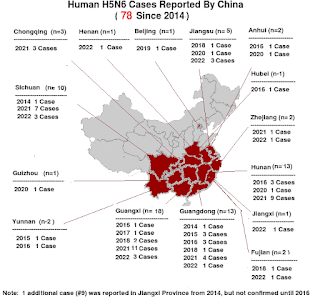#16,760
It's been nearly a month since China last reported a human H5N6 case, which involved a patient who became infected in late March. Belated reporting of cases, often by a month or more, is not uncommon by China.
Today's case involves a 49-year-old male living in Guangxi province who fell ill on April 16th and died on April 24th. This is the 14th case reported by China in 2022, although we have no way of knowing how comprehensive these numbers really are.
Since late in 2020, we've seen a marked increase in cases, with more than 50 reported over the past 18 months. Since China has not reported a concurrent jump in H5N6 outbreaks in poultry, there are reasons to believe the virus may be spreading stealthily in vaccinated birds, from which it occasionally jumps to humans.
The notification, published by Hong Kong's CHP follows:
CHP closely monitors human case of avian influenza A(H5N6) in Mainland
The Centre for Health Protection (CHP) of the Department of Health is today (May 18) closely monitoring a human case of avian influenza A(H5N6) in the Mainland, and again urged the public to maintain strict personal, food and environmental hygiene both locally and during travel.
The case involves a 49-year-old male living in Baise City in Guangxi, who had visited a live poultry market before onset. He developed symptoms on April 16 and was admitted for treatment on April 18. He passed away on April 24.
From 2014 to date, 78 human cases of avian influenza A(H5N6) have been reported by Mainland health authorities.
"All novel influenza A infections, including H5N6, are notifiable infectious diseases in Hong Kong," a spokesman for the CHP said.
Travellers to the Mainland or other affected areas must avoid visiting wet markets, live poultry markets or farms. They should be alert to the presence of backyard poultry when visiting relatives and friends. They should also avoid purchasing live or freshly slaughtered poultry, and avoid touching poultry/birds or their droppings. They should strictly observe personal and hand hygiene when visiting any place with live poultry.
Travellers returning from affected areas should consult a doctor promptly if symptoms develop, and inform the doctor of their travel history for prompt diagnosis and treatment of potential diseases. It is essential to tell the doctor if they have seen any live poultry during travel, which may imply possible exposure to contaminated environments. This will enable the doctor to assess the possibility of avian influenza and arrange necessary investigations and appropriate treatment in a timely manner.
While local surveillance, prevention and control measures are in place, the CHP will remain vigilant and work closely with the World Health Organization and relevant health authorities to monitor the latest developments.
The public should maintain strict personal, hand, food and environmental hygiene and take heed of the advice below when handling poultry:The public may visit the CHP's pages for more information: the avian influenza page, the weekly Avian Influenza Report, global statistics and affected areas of avian influenza, the Facebook Page and the YouTube Channel.
- Avoid touching poultry, birds, animals or their droppings;
- When buying live chickens, do not touch them and their droppings. Do not blow at their bottoms. Wash eggs with detergent if soiled with faecal matter and cook and consume the eggs immediately. Always wash hands thoroughly with soap and water after handling chickens and eggs;
- Eggs should be cooked well until the white and yolk become firm. Do not eat raw eggs or dip cooked food into any sauce with raw eggs. Poultry should be cooked thoroughly. If there is pinkish juice running from the cooked poultry or the middle part of its bone is still red, the poultry should be cooked again until fully done;
- Wash hands frequently, especially before touching the mouth, nose or eyes, before handling food or eating, and after going to the toilet, touching public installations or equipment such as escalator handrails, elevator control panels or door knobs, or when hands are dirtied by respiratory secretions after coughing or sneezing; and
- Wear a mask if fever or respiratory symptoms develop, when going to a hospital or clinic, or while taking care of patients with fever or respiratory symptoms.
Ends/Wednesday, May 18, 2022Issued at HKT 18:30
Given China's growing COVID problem, it is far from clear how much of China's avian flu problem is being reported.
Stay tuned.
